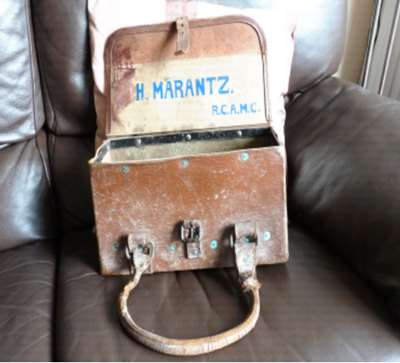Second World War
Artifact W2-12: A Remarkable Discovery and an Act of Kindness
Provided by B. Denis Marantz

My father, Captain Harry Marantz, was felled by a German .88 on August 14th 1944 in the fighting to cross the bridge at Clare Tizon in Normandy, one of the many battles to close on Falaise. A doctor, he was detached from the Royal Canadian Army Medical Corps to the Queen’s Own Cameron Highlanders of Winnipeg.
In my desire to know more about my father, I have worked assiduously to learn everything I can. I have acquired his military service records, contacted old comrades and searched the news archives.
Gradually, I was able to build a portrait of my father at War and believed I had pursued all possible avenues in doing so. But on the 22nd of April, 2012 an unexpected and unsolicited act of generosity made it possible for my family to be united with the medical case my father used in action.
On that day, I was relaxing in my Tyne Valley, PEI home sipping a glass of wine and checking my emails. To my astonishment I found a message which began:
“Can you forward this e-mail to Mr. Denis Marantz who is Board Member of the Stewart Memorial Hospital in Tyne Valley, PEI? I do not have his mail address.”
The email came from Mr. Leo Mackenbach from Spijkenisse in the Netherlands. He and his wife, Liesbeth, he wrote, had been attending a flea market in their city where they found a leather case. “We purchased it just for fun and inside…. found the name H. Marantz R.C.A.M.C.”
Mr. Mackenbach searched the internet in an attempt to learn about the Canadian solder who at one time owned the case. He discovered information about my father’s service, his time and place of death and burial. He then went to the effort of searching for family members. He found me through a newspaper article I had written giving details about the burial of my father.
I immediately telephoned Mr. Mackenbach at his home in the Netherlands and Mr. Mackenbach generously offered to send the case to me, which he has done.
How it travelled from the place where my father died in Normandy to reappear in a town in the Netherlands 68 years later no one knows. Most probably the hospital unit had taken the case and contents along as it moved through France into Belgium and the Netherlands.
It is beyond my ability to express how moved I have been by Mr. Mackenbach’s gracious act and how much it means to all my family to possess this tangible reminder of my father’s service to this country.
Capt. Marantz’s case and papers have been donated to the War Museum.
(For a fuller account of Mr. Marantz’s discoveries about his father’s service please see “Connections” in Vol. 24, No.1 of “The Torch” on this website under Publications.)
